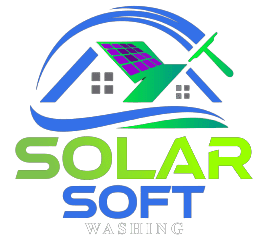Solar Safe Chemicals

Solar Safe Chemicals
Posted on May 24th, 2023
*While it is generally advisable to avoid using chemicals when cleaning solar panels, there are instances where their use becomes necessary. In this article, we will explore the importance of minimizing chemical usage while cleaning solar panels and identify scenarios where a chemical application may be unavoidable.
Though the majority of cleaning customers are focused on panel production, proper cleaning and maintenance are essential for the longevity of solar panels. Dust, dirt, debris, bird droppings, and other pollutants can accumulate on the surface and deteriorate the seal between the frame and solar glass, reducing the panels' lifespan. Regular cleaning helps maximize energy production, yes. However, the value in protecting the long term investment in solar power systems is the biggest reason for keeping them clean and maintained.
The first and foremost principle in solar panel cleaning is to minimize the use of chemicals. Chemicals can potentially harm the environment, corrode panel components, and leave residue that diminishes the panels' performance. Whenever possible, it is advisable to explore alternative cleaning methods that rely on non-chemical means.
One scenario where chemical usage may become necessary is when there is heavy lichen (algae) buildup on solar panels. If left unaddressed, it can compromise the long-term performance of the solar panels. In such cases, carefully chosen cleaning chemicals can effectively eliminate lichen and restore the panels' efficiency. To prevent heavy lichen buildup or other issues caused by neglect, it is recommended to clean solar panels at least once a year. Regular cleaning sessions can help maintain optimal energy production and ensure the panels operate at their maximum capacity for years to come.
In certain circumstances, such as new construction homes or pools being installed nearby, solar panels may be subjected to overspray of paint or cement. These substances can adhere to the panel surfaces, making it difficult to remove without the use of mild chemicals. In such cases, it is crucial to use appropriate cleaning chemicals specifically formulated for solar panels and follow the manufacturer's instructions diligently.
When chemicals are required, it is essential to choose mild, non-abrasive, and environmentally friendly options. Avoid using harsh detergents, solvents, or abrasive cleaners that can cause damage. Always read the labels, follow the instructions carefully, and use minimal amounts of chemicals to achieve the desired results. Use low level bleach products that are approved by manufacturers and silicone based antistatics for protectants.
While it is always preferable to avoid chemical usage when cleaning solar panels, there are specific situations where their application becomes necessary. Heavy lichen buildup and overspray of paint or cement from nearby construction activities are examples where mild and appropriate chemicals can assist in restoring the panels' efficiency. Nonetheless, it is crucial to minimize chemical usage, select environmentally friendly options, and adhere to manufacturer guidelines. Regular cleaning and maintenance, along with careful consideration of cleaning methods, will help ensure optimal energy production and extend the lifespan of solar panels while minimizing the environmental impact.
Get In Touch
Contact Form
Get in touch to discuss with us how we can best assist you.

